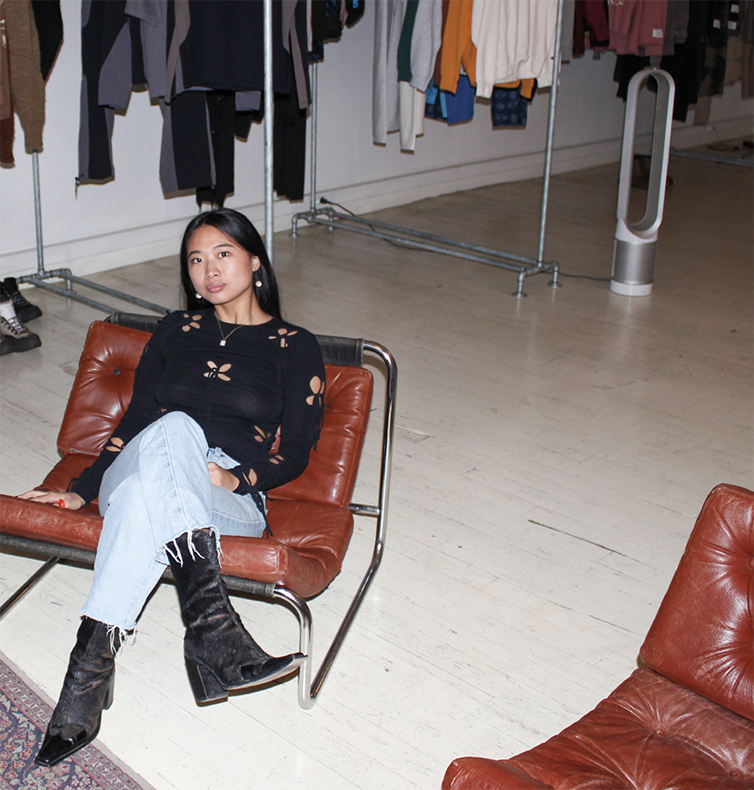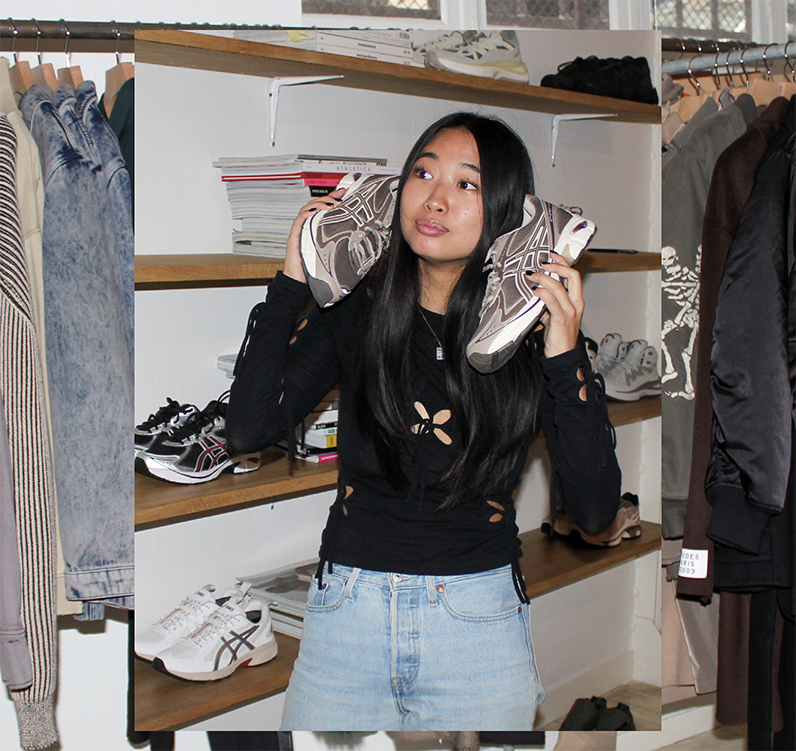
Real Talk on Fashion
Article from issue 1 of ‘later’ – the Parsons Paris alumni magazine
Story by Albert Shyong, Featuring Morgan Kim


Fashion’s exterior is always gilded but its inner workings are often mystifying and shrouded to the public eye. In Paris, Morgan works as a PR at an agency, and Albert as an editor of a magazine.
Hi, Morgan. Thank you so much for joining me. I wanted to talk to you because I work in press, you’re in PR, and these are domains on which fashion truly thrives. What made you choose a career in fashion after graduation?
Obviously, I came to Paris to study fashion design, and that had been my dream since childhood. I was captivated by the idea of fashion, my preconceptions about it, and what it represented. After graduating, I felt compelled to make it worthwhile, considering the tuition and the years I spent away from the United States. I graduated during the COVID era, and finding internships was extremely challenging. So, I took the first opportunity that interested me, which happened to be working at a magazine.
In my role as a production assistant, I was responsible for organizing photo shoots and sending brands the pictures after the magazine was published. It was fascinating, but I later realized that I didn’t necessarily want to work in press.
Girl, what’s wrong with press?
I don’t know. I just didn’t connect with it. But I was drawn to PR because I love runway shows. Many people in my industry would agree that organizing them isn’t their favorite task.
And all I have to do is attend.
Exactly. What you see is just the tip of the iceberg. The behind-the-scenes work can be demanding, but I genuinely enjoy it. So, after my time at the magazine, I interned at Ritual Projects, a company I had followed throughout school. I had briefly worked as a freelance content creator for Snapchat, where they sent me to shows. I loved attending shows and wanted to explore the other side of the industry.
After Ritual Projects, you began working at one of the most prominent PR firms in Paris, if not in all of fashion – Lucien Pagès.
It was incredibly interesting. I didn’t stay there for long, but I consider it the best fashion PR school in the world. It operates like a well-oiled machine. You work closely under Lucien Pagès’ right-hand man. The pace is intense – you arrive around 9:30 am and leave at 8 pm, but it doesn’t stop there. You have your work emails on your phone, responding to messages at 2 or 3 in the morning due to international clients. It’s the best school to learn from.
These PR agencies are exceptionally skilled at their jobs. They are the unsung heroes of the industry, running the show behind the scenes, ensuring everything runs smoothly.
It’s not as simple as people might think. It’s not just a professional job; it’s also highly social and can become very personal as you build relationships with people in press, brands, and colleagues. Everything becomes interconnected.
What do you believe is the most significant misconception about PR?
I think the biggest misconception is that people in PR are fake. In today’s world, particularly over the past 10 to 15 years, it’s about building a community. My first boss, Robin from Ritual Projects, was excellent at cultivating a sense of community. I learned a lot from Robin. She taught me how to conduct myself in this industry. As we know, being a woman or a person of color in this field can be challenging, as the statistics show. One key thing I learned from Robin is not to let anyone disrespect you, that no one is allowed to walk all over you. Another misconception is that PRs are spineless.
Where are you working now?
I’m at Radical PR, which is the first agency in Paris that I know of, founded by people of color. It’s an amazing place because our team is incredibly diverse, with people from various backgrounds, primarily French and American. The agency is relatively young, about five years old, with founders under 40, making the rest of the team even younger. It’s an exciting environment to work in, even though it has its challenges with contacts. We’re not deeply connected with traditional press, but we’re making progress and have built a strong sense of local community. Since I’ve joined, things have been on the up and up.
You’ve worked at mega PR firms, smaller agencies, and young firms. You’ve experienced various aspects of the PR industry. Do you believe this is your true calling?
I’m not entirely sure. It’s something I’ve been contemplating a lot. It hasn’t been that long since I graduated – I graduated in 2020, a year before you. Whether this is my calling or not is a question I grapple with. The key is finding balance because PR can consume your life. When I was at Lucien Pagès, I wanted to excel and prove myself. I aimed to reach their level, but I didn’t consider my age and the long journey ahead. I’m unsure if I’ll stay in PR, fashion, or pursue other artistic interests. I want to get back into design.
PR operates behind the scenes within the fashion industry. What does PR entail in your words?
PR feels like juggling five jobs in one. People often perceive only the side of PR that involves emails or attending shows, but it encompasses much more. On a daily basis, you communicate with clients, understand their vision, and not just one client – during my time at Lucien Pagès, I managed seven clients essentially by myself. It’s about building relationships and curating the right publications and VIPs to wear the clothes. This includes sample trafficking, where brands send their collections for distribution to the right people, and you decide what’s best for the brand. You curate potential looks for magazines to shoot and handle the logistics, such as sending them to the right address. You ensure you have the correct contacts and keep track of which pieces were used. Event planning is another crucial aspect, including presentations, activations, and not just during fashion weeks, but also for store openings and special events. It’s a multifaceted role, combining all these elements, which is why people in the industry often feel overwhelmed and underpaid.
Because our industry operates on a seasonal cycle, with two seasons a year plus men’s and women’s, it’s incredibly fast-paced. Aside from the issue of sustainability, the pace definitely takes a mental and emotional toll.
That’s why many brands aim for viral moments these days. However, most of the places I’ve worked with and the brands I’ve collaborated with prioritize building long-term relationships with clients, customers, and the press, rather than just seeking viral moments. Another misconception is that PRs focus solely on creating a big buzz before retreating to their caves. We’re always there whenever something is communicated about a brand. It’s challenging because you can’t predict how people will react to a project.
I’m curious about what you think the differences are between studying fashion in school and actually working in the industry.
One thing they don’t teach you in school is that the industry is always evolving. They teach you how it is at that moment, but the reality I discovered while working is that what they teach in school quickly becomes outdated. It’s not that they’re teaching incorrect things, but it was accurate at the time. To truly understand the industry, hands-on experience is crucial. You’ll never fully grasp the entire industry; that’s something you need to accept. There will always be aspects you won’t understand. Be a decent human being and treat everyone well, and the rest will come with experience.
Do you love the industry? Do you love fashion?
It’s like Paris – I have a love-hate relationship with it, depending on the day. When I’m at a show and see people react positively to something I worked hard on and enjoyed, I’m happy and feel accomplished. Similarly, when I organize an event for a brand I truly support, especially one that stands for something meaningful, I’m content. However, there are days when I wonder what we’re even doing. Many brands and PRs can be passive about global issues. I hate it when people tell me, “That’s just the way things are.” Honestly, if everything had stayed the same, you and I wouldn’t even be working in this industry. So, my biggest piece of advice is to never assume things will remain stagnant. Keep pushing for change, and it will come. I have faith that it will.
One last question. What advice do you have for someone who loves fashion and wants to work in the industry? Any tips or warnings for Miss Girl?
Miss Girl, it’s going to be challenging. It’s been one of the toughest experiences since I graduated. But hard work doesn’t go unnoticed. If you’re passionate and work hard, you don’t have to take everything your professors say to heart. Consider their opinions because they have a reason, but don’t take them as absolute truth. Follow your gut – it’s often right. I can’t count how many times I had an idea in school that my teacher was unsure about, and years later, it’s on the runway. Follow your instincts.